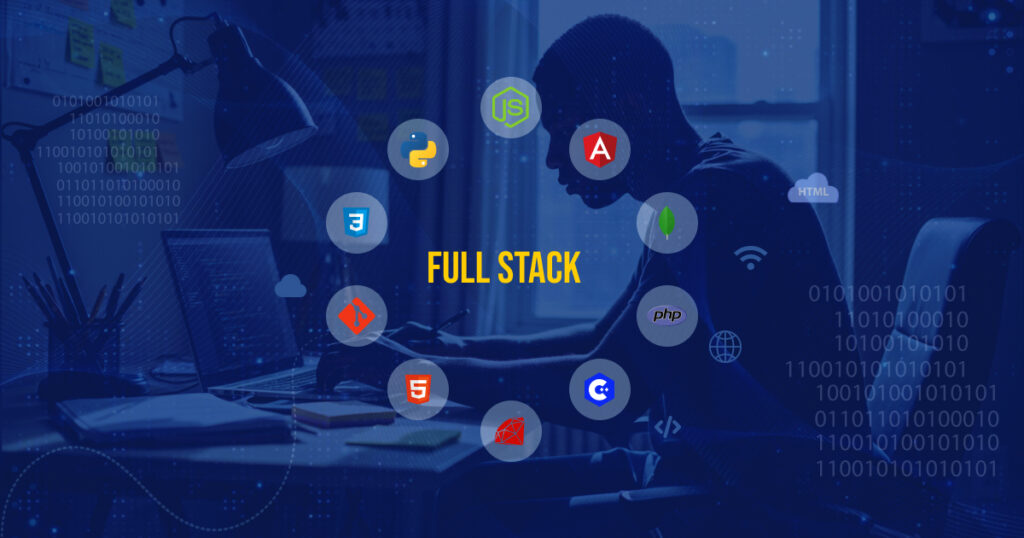Jul. 18, 2025
4 min read
Ever met a full-stack developer? They’re like the Swiss Army knives of the tech world, capable of crafting the sleek buttons you click and the hidden databases that make everything work. Some say they’re mythical creatures (unicorns, perhaps?), but the truth is, anyone can become one with the right roadmap.

If you’re just starting out in coding, you might be wondering: Should I specialize in frontend or backend first? Or should I go full-stack right away? And more importantly, what even is full-stack development?
Let’s break it all down in a way that won’t make your brain melt.
What Exactly Is Full-Stack Development?
Imagine you’re using an app to order coffee. You tap a button on your phone (the frontend), and behind the scenes, servers process your order, check inventory, and charge your card (the backend).
Full-stack development simply means you can build both sides:
- Frontend (what users see and interact with)
- Backend (the data and logic powering the experience)
Think of full-stack developers as architects who understand the entire building, from the paint on the walls to the plumbing behind them.
Why Is Full-Stack Development So Popular?
A few reasons:
- Versatility: Companies love hiring people who can move between frontend and backend work.
- Efficiency: You can build an entire app yourself without waiting on other specialists.
- Perspective: Understanding the big picture helps you make better design and architecture decisions.
That said, it also means a lot to learn, which can feel overwhelming at first.
The Core Skills You’ll Need
Here’s a broad map of what a beginner full-stack developer learns:
Frontend Skills
These are the tools you’ll use to create interfaces:
- HTML/CSS: The foundation of web pages
- JavaScript: The language of interactivity
- Frontend frameworks: React, Vue, or Angular
- Responsive design: Making sure it looks good on any screen
Backend Skills
These power your app’s functionality:
- A server language: Node.js (JavaScript), Python, Ruby, PHP, or Java
- Databases: SQL (PostgreSQL, MySQL) or NoSQL (MongoDB)
- APIs: How your frontend talks to your backend
- Authentication: Managing user accounts and security
DevOps & Deployment Basics
- Version control: Git
- Hosting platforms: AWS, Heroku, Vercel
- Command line: Navigating and managing servers
Should You Start as a Full-Stack Developer?
Many beginners wonder: Is this too much to bite off?
It depends on your goals and learning style.
Good reasons to start full-stack:
- You want to build and launch your own projects end-to-end.
- You enjoy variety and switching contexts.
- You’re still figuring out what you enjoy most.
Reasons to specialize first:
- You prefer mastering one area before moving on.
- You’re applying for a job where deep expertise in frontend or backend is required.
The truth is, even if you start full-stack, you’ll naturally spend more time on one side as you grow. That’s perfectly normal.
Tips for Getting Started
- Pick a Stack
Beginners often choose:
-
- MERN: MongoDB, Express, React, Node.js
- LAMP: Linux, Apache, MySQL, PHP
- Django + React: Python backend with a React frontend
Sticking to one stack helps reduce decision fatigue.
- Build Real Projects
The fastest way to learn is to create something. A simple app, a to-do list, a blog, and a recipe manager will teach you more than months of tutorials.
- Learn Version Control Early
Git is essential. It feels awkward at first, but you’ll thank yourself later.
- Don’t Be Afraid of Back-End Concepts
Databases and APIs can seem intimidating. Take them one small piece at a time.
- Join Communities
You don’t have to figure everything out alone. Consider joining a Discord server, subreddit, or local meetup.
Final Thoughts
Full-stack development can feel like drinking from a firehose. But with patience and a project-focused mindset, you’ll gradually connect the dots.
Whether you end up specializing or staying full-stack, you’ll be building the kinds of experiences that power modern life, and that’s a pretty rewarding place to start.